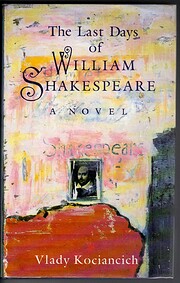

Carregue numa fotografia para ir para os Livros Google.
|
A carregar... The Last Days of William Shakespeare (original 1990; edição 1990)por Vlady Kociancich
Informação Sobre a ObraThe Last Days of William Shakespeare: A Novel por Vlady Kociancich (1990)
 Nenhum(a) Ainda não há conversas na Discussão sobre este livro. sem críticas | adicionar uma crítica
Set in the capital of an unspecified South American country, the novel covers a period of a few months known as the days of National Reconstruction of Culture. It conveys the peculiar madness of Argentinian politics and attitudes to Europe and national culture. Não foram encontradas descrições de bibliotecas. |
Current DiscussionsNenhum(a)Capas populares
 Google Books — A carregar... Google Books — A carregar...GénerosSistema Decimal de Melvil (DDC)863Literature Spanish and Portuguese Spanish fictionClassificação da Biblioteca do Congresso dos EUA (LCC)AvaliaçãoMédia: (3.6) (3.6)
É você?Torne-se num Autor LibraryThing. |
||||||||||||||||||||||||||||||||||||||||||||||||||||||||||||||||||||||||||||||||||||||||||||||||||||||||||||||||||||||||||||||||||||||
I read this deeply provocative novel by Argentine author Vlady Kociancich back in 1991 when first translated into English. The fantastic, the nightmarish, the theatrical, the farcical intertwine as part of a potent cautionary tale of expression and repression, all to the cries of "Down with Shakespeare! Down with Shakespeare! Down with Shakespeare!"
As an essential component of an unnamed South American city's Campaign for Cultural Reconstruction, President Herrero National Theater is taken over and the long run (856,904 consecutive performances) of Shakespeare's Hamlet is shut down and replaced by a play in line with the new rigidly enforced agenda. Sound ridiculous? What begins as so much bunk and buffoonery ends up squeezing an entire country in the iron fist of fascism.
"The play's the thing" - The Last Days of William Shakespeare's short chapters alternate between our following aged, prizewinning novelist Santiago Bonday bumbling along passively with the ascending powers, more out of boredom than anything else, and slim, literary, artsy twenty-one year old Renata relaying her own story first-hand though letters, diary entries and reportage of unfolding events. Midway though the novel, Bonday and Renata cross paths, just at the point where things really start to get dicey.
The transition from Shakespeare plays and a world where vendors can sell their fruits and vegetables without government interference to jackboot intimidation and conformity is gradual, thus Bonday, Renata and others working for the theater are lulled into acceptance.
Watching this switch happen might be funny in spots since there’s a Mad Hatter tea party and Gary Larson cartoonishness to much of the absurdity and madness, but the more we turn the pages, the various happenings become eerie and downright creepy until they finally turn murderous. In this way the novel has a particular relevance in today's political climate.
Bonday is given direct hints of what will become the city’s progressively darker, more sinister political and social climate when Captain Beh, key leader of the new cultural order, joins him at a gallery opening and degrades an artist’s Hannah Höch-like montage as sheer obscenity, rubbish not suitable for a decent family’s eyes. Such harsh judgement parallels the Third Reich’s brutal degradation of works of modernist art, including the infamous 1937 Degenerate Art exhibit that toured Germany, an exhibit where Chagall, Grosz, Kandinsky, Klee, Marc and Nolde were all held up for ridicule.
During a public speech the captain rails: “Does the culture we see around us today deserve to be placed on a pedestal, as all the developed countries claim? I say not. For what is the reality of this so-called culture? The loss of traditional values.” What a howler! How many times have bozo politicians blabbed about “family values,” as in making sure the population lives in mindless lockstep: men showing up at their crap jobs, keeping women in the kitchen and not letting kids question authority.
"When sorrows come, they come not single spies. But in battalions!” - All of the tricks and techniques of a dictatorship and police state are on display: depriving people of sleep to push them to exhaustion, inciting fear by planting bombs, staging sham attacks, abducting “dangerous” people, and, last but not nearly least, demanding attendance at mass rallies. On this last point, I had the sense these “improvers of our national heritage” where filming their own productions along the lines of Leni Riefenstah’s Triumph of the Will.
The story’s tender moments revolve around sweet, sensitive Renana. Even with all the surrounding idiocy, Renata takes time to share her ideas and feelings in letters about literature and the art. Most certainly every reader will find this one of the most appealing parts of Vlady Kociancich’s novel. For example, how the nature of human memory turns all of our past into fiction, where every person becomes a character and every locale a scene in a play.
Alas, Renata can also take a stand. At one point her theater colleagues turned fascists attempt to strong-arm Renata into submission to join them arm-in-arm for the cause against Shakespeare. Our courageous heroine raises her voice: “I have no brothers and sisters, and if I wanted any, I certainly wouldn’t choose them from among your uniformed hirelings.”
A tale of caution and vivid imagination, a novel that has regrettably been mostly overlooked. I can't recommend The Last Days of William Shakespeare highly enough.
"Being an upright citizen, I will of course adhere to the government's latest's drastic resolution, but as an artist I cannot deny that there is in William Shakespeare a smidgen of poetic inspiration, the odd effective scene, and the occasional memorable character." - Vlady Kociancich, The Last Days of William Shakespeare (